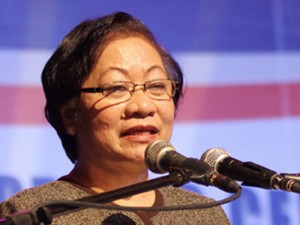Deportation of 289 Filipinos not due to Sabah issue, says Labor chief
MANILA, Philippines–Labor Secretary Rosalinda Baldoz on Tuesday clarified that the deportation of almost 300 Filipinos from Sabah was not in any way connected to the conflict there between the Malaysian authorities and followers of Sulu Sultan Jamalul Kiram III.
“I was informed by our field officials in Zamboanga that the 289 are regular deportees who came from all over Sabah and Peninsular Malaysia through regular commercial vessels from Sandakan,” said Baldoz.
The deportees arrived Sunday night.
“In fact, our data shows that 195 deportees from Sandakan, Sabah arrived on January 6, while another 109 deportees arrived on January 12, bringing the total deportees to 897 this year alone.
“The transportation expenses of these deportees were shouldered by the Malaysian government,” she added.
Baldoz said that due to this seeming rise in the number of deportees, she had ordered the Department of Labor and Employment Regional Coordination Committee in Zamboanga to strengthen the One-Stop Shop Processing Center to provide assistance to Filipino deportees from Sabah at the height of the Malaysian crackdown on illegal immigrants in 2005.
“We have the template on how to deal with the arrival of deportees and we are activating it and strengthening it if there will be an influx of deportees,” she said.
Malaysian immigration records show that there are 57,500 Filipino workers with work permit in Sabah as of 2010. These Filipinos went to Sabah illegally and did not pass through Philippine Overseas Employment Administration processing. There are another 95,951 illegal workers registered under the Malaysian’s Operation Bersepadu in 2010.
The OSSPC, located at the Area Vocational and Rehabilitation Center in Mampang, Zamboanga City, was created through Administrative Order No. 115 on 5 March 2005.
Baldoz, then administrator of the Philippine Overseas Employment Administration, supervised its operations, even visiting Bongao in Tawi-Tawi and Sandakan and Kota Kinabalu in Sabah to coordinate with Malaysian employers and authorities for the safe return to the Philippines of undocumented OFWs and their safe and legal return to Malaysia.
The OSSPC provides various services to the deportees, including transient stay, passport services, National Statistics Office birth certificate issuance, National Bureau of Investigation clearance issuance, TESDA training, POEA processing of Overseas Employment Certificate, Overseas Workers Welfare Administration membership, reintegration services such livelihood, capability building, and entrepreneurship skills, and referral for local employment.
“The DOLE is ready to help facilitate the smooth arrival of the deportees and we are ready with our reintegration programs and other services. However, we must work in convergence with other national agencies and local government authorities,” Baldoz said, citing the Department of Social Welfare and Development, the DOLE partner that profiles the deportees, provides food, accommodation, transportation, and other humanitarian and support services.
